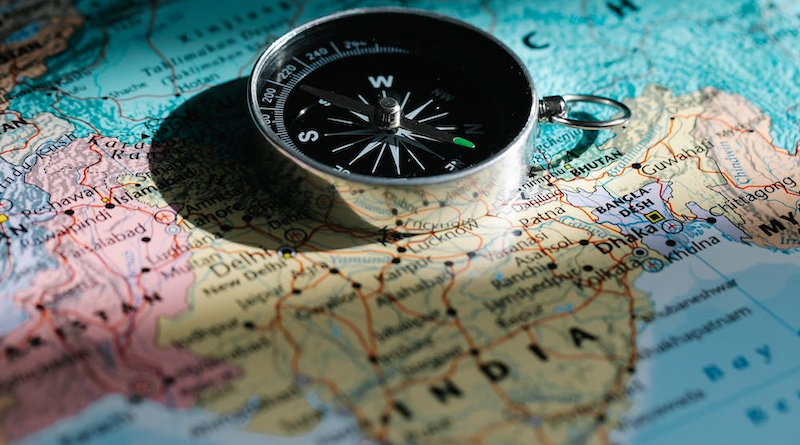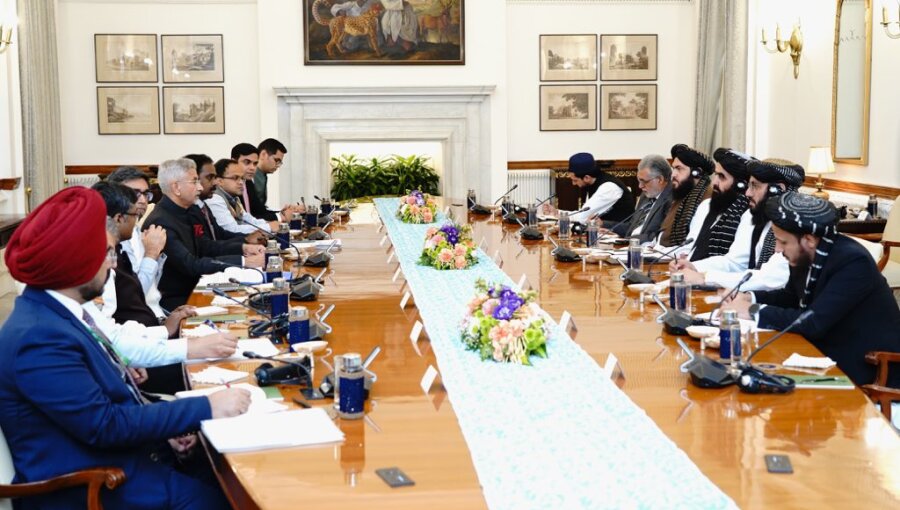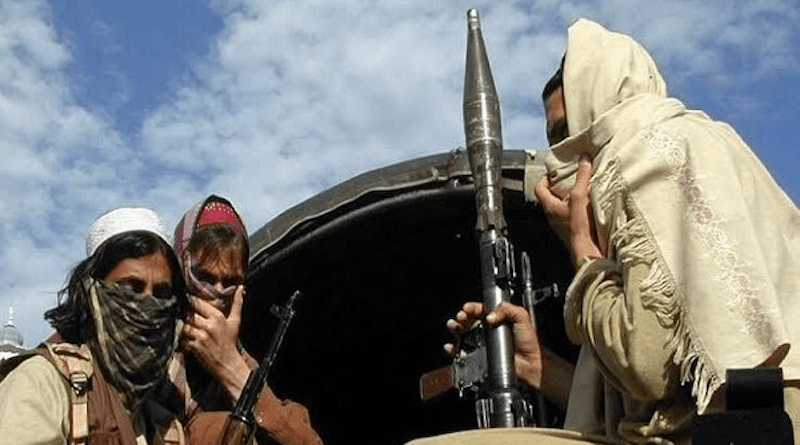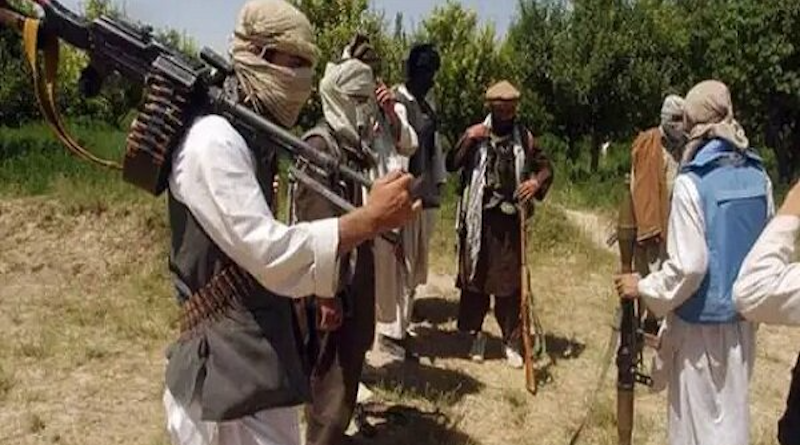Aizaz Ahmad Chaudhry
THE Afghan Taliban regime is living under an illusion. Visiting India, its interim foreign minister recently stated that Afghanistan had defeated the British, the Soviets and the Americans. No, they had not. The Afghan rulers of the time were decisively defeated in the second Anglo-Afghan war (1878-80) by the British, enabling the latter to effectively make Afghanistan a buffer zone in the Great Game between the Raj and the Russian empire. Abdul Rahman Khan accepted the Durand Line as the border with British India, which was endorsed by subsequent Afghan rulers. As for the Soviets, it was the concerted effort by the US and Pakistan that pushed them out and rescued the Afghan people in the 1980s. America’s presence in Afghanistan since 2001 also ended only when the US itself decided to exit in August 2021 because of American public opinion turning against distant wars and the strategic depth the Taliban had received in Pakistan.
For over four years now, the world has expected the Taliban to honour their commitments under the 2020 Doha peace accord with the US. However, they have violated all three promises: forming a true representative government, respecting women’s rights, and not allowing terrorist entities on Afghan soil.
With Pakistan, the Taliban have adopted a particularly hostile attitude, having lately embarked upon a two-pronged manoeuvre. The first prong is teaming up with India to not only benefit from Indian investments in healthcare, education and infrastructure, but to also doubly squeeze Pakistan under the mistaken belief that Pakistan’s enemy is their friend. For its part, India, which has severely criticised Taliban in the past, has reversed its policy in order to leverage the Taliban against Pakistan, just as the Taliban are leveraging it against Pakistan. India hopes to wean the Taliban further away from Pakistan and even China.
The second prong is an upsurge in the Taliban’s kinetic aggression to destabilise the Pak-Afghan border (Oct 11-12, 2025) while ignoring Pakistan’s consistent protests against the Taliban’s support to the TTP (and other anti-Pakistan elements) who have killed children and other innocent civilians in Pakistan. For now, Pakistan has repulsed the assaults and inflicted heavy losses on the Taliban forces and their TTP associates. However, it is evident that the Taliban won’t heed Pakistan’s advice to not allow terrorist elements on their soil. Instead, the Afghan leadership tends to shift the burden of any action to Pakistan, arguing that these terrorists should be handled inside this country. The Taliban media is also spreading disinformation, taking a leaf out of the Indian media’s playbook.
Why are the Taliban inimical towards Pakistan?
Why are the Taliban so ungrateful and inimical towards Pakistan? It appears that they are trying to be nationalist in order to garner support from the wider Afghan society. Perhaps they wish to give the impression that they aren’t under Pakistan’s influence. They are hosting the TTP probably as a leverage against Pakistan. In doing all this, they are overestimating their power potential, and may be in for a rude shock. It would be prudent for them not to underestimate Pakistan’s resolve to defend its borders and defeat Taliban-backed terrorists.
How should Pakistan deal with the Taliban? Several steps can be considered in the immediate term: One, Pakistan should maintain its robust defence at the borders with Afghanistan (and India). Only strength can deter aggression. Two, it should send a clear message to Kabul that the doors for dialogue are open, provided the Taliban firmly commit to ending their support to the TTP. If they do not commit to that, then kinetic options would remain on the table. Three, Pakistan must keep up the pressure on the Taliban through diplomatic outreach to Saudi Arabia (now a partner in mutual defence), China, Russia, Iran, the Central Asian Republics, Turkiye, the UAE and America. Given the Taliban’s past association with Al Qaeda, the global community would not want to see the Taliban hosting terrorist entities again. Pakistan should also register its complaints in the UN under the UNSCR 1988 (1267) sanctions regime.
In the medium term, Pakistan should develop a nationwide consensus on a review of its previously generous policies regarding Afghan refugees, scholarships for Afghan students, special desks in its hospitals for Afghans, collecting custom duties on transit trade through Pakistani ports, and media outreach to Afghan society. Experts could be invited to suggest doable measures. In the long term, an effort could be mounted to win the hearts and minds of our nationals living in the erstwhile Fata region bordering Afghanistan through development work. They are the first line of defence against terrorism from Afghanistan.
Published in Dawn, October 19th, 2025
Muhammad Amir Rana
THERE is little optimism or even enthusiasm surrounding the post-ceasefire talks between Afghanistan and Pakistan taking place in Doha. Yet, it would be unwise to dismiss them outright. If one assesses the potential pragmatically, these discussions could evolve into a ‘Doha pact’ of their own, echoing the 2021 agreement between the Taliban and the US that altered the regional geopolitical landscape.
Facilitated by Qatar and Saudi Arabia, the Taliban have agreed to sit down with their Pakistani counterparts in Doha to discuss bilateral relations and the possible extension of the ceasefire, which was initially agreed upon for just 48 hours after recent border clashes between the two countries.
Should the two sides reach an understanding akin to the earlier Doha accord, where the Taliban provide verifiable guarantees that the TTP and other Afghan-based militants will not operate against Pakistan, it could prove transformative. Such an agreement would not only redefine the troubled bilateral relationship but could also reshape the regional landscape. The prospects for transnational connectivity, trade and mega infrastructure projects linking Central and South Asia would expand dramatically, offering tangible improvements to the lives of millions across the region.
However, the Taliban leadership does not have such a vision, and the major problem with the Taliban leadership lies in its deeply conventional mindset in both political and religious thinking. This rigidity stems mainly from their madressah education, whether in Pakistan or Afghanistan. Most of their leaders, whether graduates or dropouts, share the same worldview, cutting across all factions and shades of leadership, from the so-called ‘moderates’ like Abbas Stanikzai to the Haqqanis and hardliners such as Mullah Abdul Hakim Haqqani.
The Taliban perceive the world as something that must learn to accommodate them.
They perceive the world as something that must learn to accommodate them or strive to understand them, while they see no reason to change themselves. They consider themselves victorious, having defeated great powers, and believe the world should now deal with them on their terms. Consequently, they show little willingness to reconsider their orthodox, religiously driven policies of moral policing or their severe restrictions on women and other vulnerable segments of society, despite appeals from respected religious scholars across the Islamic world.
Their mindset is incompatible with evolving global norms, and even with the political realities of authoritarian yet relatively modern Muslim societies. Why, then, should others be expected to give them time or understand their so-called compulsions, which they often cite when discussing terrorism-related issues with Pakistan and neighbouring countries? Why should Pakistan and others continue to listen to them and at what cost? Must Pakistan continue to bleed at the hands of the TTP and other militant groups while the Taliban offer themselves as mediators between the state and terrorists?
In contrast, when militant groups rooted in Al Qaeda and Daesh captured parts of Syria, their behaviour, both internally and in their engagement with the world, was notably different. One understands that Afghanistan is not Syria. Syria, despite its devastation, is attempting to rebuild through a fragile but ongoing national consensus and is showing a willingness to align, at least partially, with regional and global norms. The Taliban, by comparison, have failed to foster any such consensus at home.
Unlike in Syria, where elements of the leadership remain visible, reachable, and at times open to dialogue with world powers, including the US and Russia, the Taliban’s supreme leader, Mullah Hibatullah Akhundzada, remains hidden. The reasons for his seclusion are unclear. Officially, it is attributed to ‘security concerns’, but these explanations no longer hold much weight. What is he afraid of? Lack of confidence, fear of dissent, or simply an inability to step out of a wartime mindset? No one truly knows who is making decisions on his behalf. The Taliban’s internal communications are riddled with contradictions, and myths continue to swirl around their leadership.
One recent example illustrates this opacity and confusion. Reports emerged that Mullah Hibatullah had ordered an internet shutdown across Afghanistan, citing concerns that WhatsApp and other social media apps were spreading obscenity, vulgarity, and music. Yet, just a few days later, he reportedly asked an aide why he was no longer receiving WhatsApp messages. When informed that the services had been suspended on his own orders, he reluctantly directed that internet access be restored.
Such incidents, while almost absurd on the surface, reveal a deeper problem within the Taliban’s governance structure — a leadership trapped between ideological rigidity and the demands of a connected, modern world.
The Taliban leadership is neither innovative nor forward-looking in shaping better relations with its neighbours, particularly Pakistan and China, despite the long-term advantages such engagement could bring. Instead, they continue to rely on the old Afghan template of suspicion and defiance towards Pakistan, a posture that frustrates Islamabad even more than the persistent terrorist threat the country faces daily.
India, fully aware of these sensitivities, has been quick to exploit the Taliban’s posture to its advantage, skilfully playing on Pakistan’s insecurities. For the Taliban, this dynamic serves as a convenient balancing act, using the Indian card to counter Pakistan’s pressure on issues of terrorism and border security-related affairs.
In Doha, the Taliban are unlikely to change. Neither Qatar nor Saudi Arabia possess the leverage to compel them to abandon their closest militant ally, the TTP. China, too, has failed to persuade them on this issue, and it remains unclear what strategy the Gulf mediators can employ to convince the Taliban to address Pakistan’s concerns about cross-border terrorism seriously. The likelihood is that the Taliban will continue to deny responsibility, insisting that the TTP problem is an ‘internal matter’ for Pakistan and offering, at best, vague proposals for dialogue.
To avoid embarrassing their hosts, the ceasefire between Afghanistan and Pakistan may be extended for a few weeks. But the real solution does not lie in diplomatic gestures or temporary truces. It lies in the Taliban’s willingness to completely sever ties with all forms of terrorism, something they had promised to the US in the original Doha Agreement, and a commitment they may now be compelled to make once again, this time to Pakistan.
The writer is a security analyst.
Published in Dawn, October 19th, 2025








